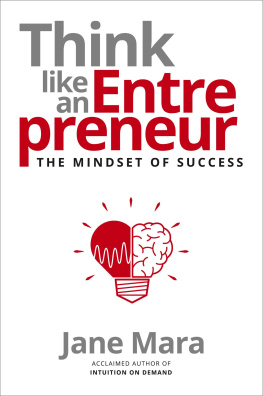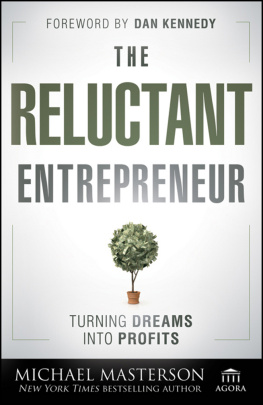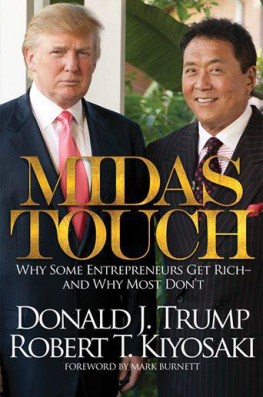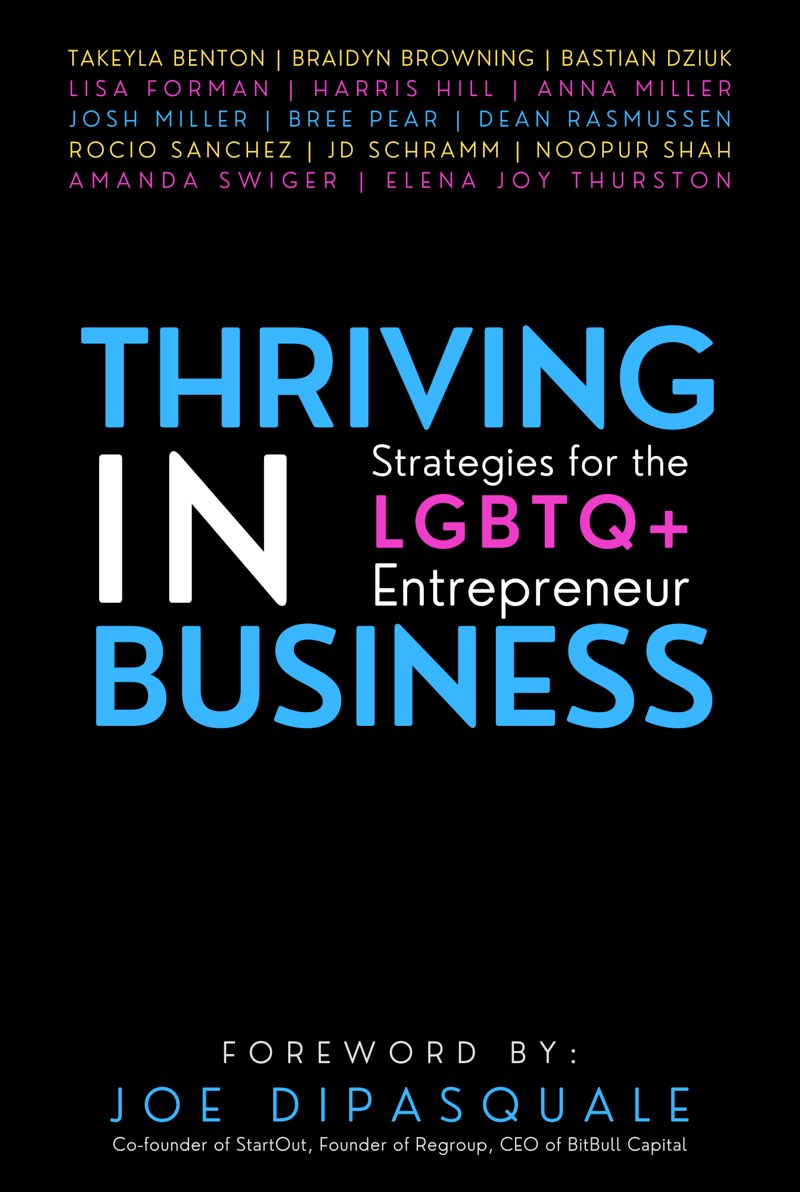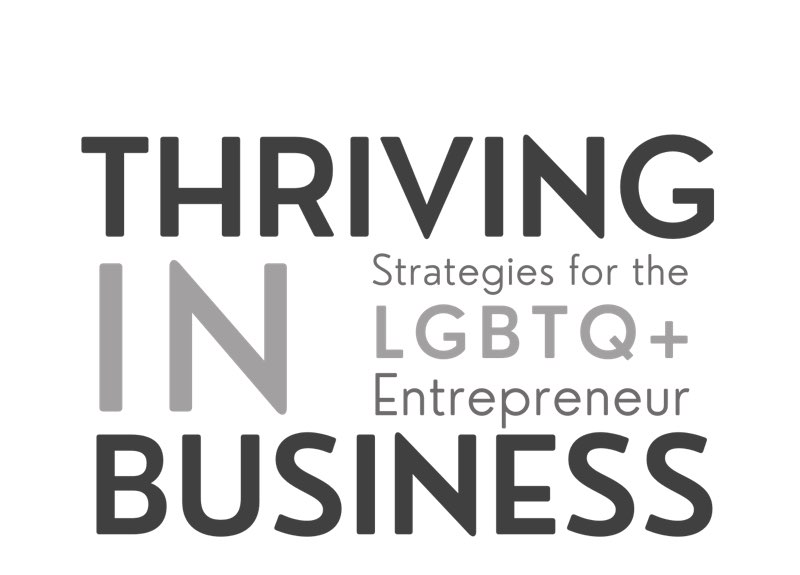Copyright 2021 by Takeyla Benton, Braidyn Browning, Bastian Dziuk, Lisa Forman, Harris Hill, Anna Miller, Josh Miller, Bree Pear, Dean Rasmussen, Rocio Sanchez, JD Schramm, Noopur Shah, Amanda Swiger, Elena Joy Thurston
Thriving in Business
Strategies for the LGBTQ+ Entrepreneur
All rights reserved.
No part of this work may be used or reproduced, transmitted, stored or used in any form or by any means graphic, electronic, or mechanical, including but not limited to photocopying, recording, scanning, digitizing, taping, Web distribution, information networks or information storage and retrieval systems, or in any manner whatsoever without prior written permission from the publisher.
An Imprint forGracePoint Publishing ( www.GracePointPublishing.com ) in collaboration with Pride & Joy Publishing
GracePoint Matrix, LLC
624 S. Cascade Ave
Suite 201
Colorado Springs, CO 80903
www.GracePointMatrix.com
Email:
SAN # 991-6032
Library of Congress Control Number: 2021917357
ISBN-13: (Paperback) 978-1-951694-78-4
eISBN: (eBook) - 978-1-951694-77-7
Booksmay be purchased for educational, business, or sales promotional use.
For bulk order requests and price schedule contact:
Orders@GracePointPublishing.com
How far weve come! When I first co-founded StartOut in 2009, a non-profit to foster and develop entrepreneurship in the LGBTQ community, there were no openly LGBTQ CEOs of Fortune 500 companies. Other groups were certainly underrepresented as well: only 5% were women, and only 1% were Black. But, in the last ten years, our LGBT community went from zero openly LGBTQ CEOs of Fortune 500 companies to several: Tim Cook of Apple, who came out publicly in 2014 after being named CEO; Beth Ford of Land OLakes, Jeff Gennette of Macys, and Jim Fitterling of Dow Chemical Company.
Yet, how far we must go. This takes our representation to 0.8% amongst the highest echelons of business leadership, while the Gallup polls 2020 update on lesbian, gay, bisexual, or transgender identification found 5.6% of U.S. adults identifying as LGBTQ. To be fairly represented, there would need to be 7x more openly LGBTQ CEOs of Fortune 500 companies.
While there are some promising statisticsLGBTQ employees who make it into senior management are much more likely to be out than closetedthere are many more that show the challenges. The unemployment rate for the LGBTQ community is 13 percent compared to 9 percent of non-LGBTQ Americans; and 53 percent report that discrimination negatively affects their work environment. Twenty-seven percent of transgender people who held or applied for a job in the last year reported being fired, not hired, or denied a promotion due to their gender identity. The transgender unemployment rate is 3x higher than the national average.
One of the wonderful things about entrepreneurs is that we are widely considered the engine of economic development. Small businesses created by entrepreneurs are disproportionately responsible for job growth. They create more than 1.5 million jobs annually in the United States, which translates to 64 percent of total new job growth. But for disadvantaged communities, so often discriminated against in traditional work environments, is there also something necessary, even freeing, about being an entrepreneur?
Entrepreneurs can create their own job and environment; perhaps this is why disadvantaged communities have a history of choosing this path. In 2019, for example, immigrant entrepreneurs made up 21.7 percent of all business owners in the United States, despite making up just over 13.6 percent of the population.
This book creates a special space for us to explore our own experiences as LGBTQ people Thriving in Business. If youre reading these pages, then perhaps you also recognize that we have something special and are grateful as I am to be connected on a deeper level: that of identity, and even community. When we bring this together with our passion for business and the practicality of commerce, we have a deep and meaningful bond that creates innumerable ways in which we can help each other. We may be underrepresented, but we can be a chosen family.
With LGBTQ resource groups abounding in even the most conservative companies and industries, this has certainly changed. For example, at a recent StartOut Awards, we honored R. Martin Chavez, former CFO of Goldman Sachs and openly LGBTQ, for his trailblazing work including starting Goldmans LGBTQ group. We also honored Martine Rothblatt for her advancements in technology as creator of SiriusXM and CEO of United Therapeutics, and Jerome Guillen for his contributions as President of Heavy Duty Trucking at Tesla. These are just a few examples of the many amazing LGBTQ business leaders in the world today.
The LGBTQ community is large, and we would all be better served by recognizing not only the diversity but also the adversity that many have been through. While its exciting to celebrate successes, we can also acknowledge the struggles of some in our community, and that we are empirically underrepresented.
The StartOut Pride Economic Impact Index, which is pioneering data on the impact of inclusion, shows that less than half a percent of all high-growth entrepreneurs in the ninety-nine metro areas studied self-identify as LGBTQ. It also shows that, with further inclusion and equality, the United States could have 427,950 more jobs created by LGBTQ entrepreneurs. This is why books like this are so needed; not only by our community, but the entire economy at the center of which is job growth and entrepreneurs who create those small businesses and jobs. For maximum prosperity in the world, LGBTQ entrepreneurs must have the skills to thrive.
Within the US, we see a great disparity in representation between places like the San Francisco Bay Area, which accounts for over 40 percent of venture capital raised by LGBTQ entrepreneurs in the US, and others. From the ninety-nine metro areas studied, over 70 percent did not have a single high-growth entrepreneur who openly identified as LGBTQ. Having these role models and this inclusivity would not only have created, by our estimates, 427,950 more jobs but would also have a compounding effect. As one study found, [the] power of role models can be harnessed to increase role aspirants motivation, reinforce their existing goals, and facilitate their adoption of new goals (Morganroth, Ryan, and Peters 2015).
Outside the United States, we know that things can be even more difficult; it is illegal to be LGBTQ in sixty-three countries and punishable by death in six of them. At a recent StartOut event, I met a gay Malaysian entrepreneur seeking asylum and a way to operate his life and business without fear of harm.
Yet, too often, I have seen real struggles fall on deaf ears. This can especially be true in the business world, where Victory has a hundred fathers, but defeat is an orphan (JFK).


